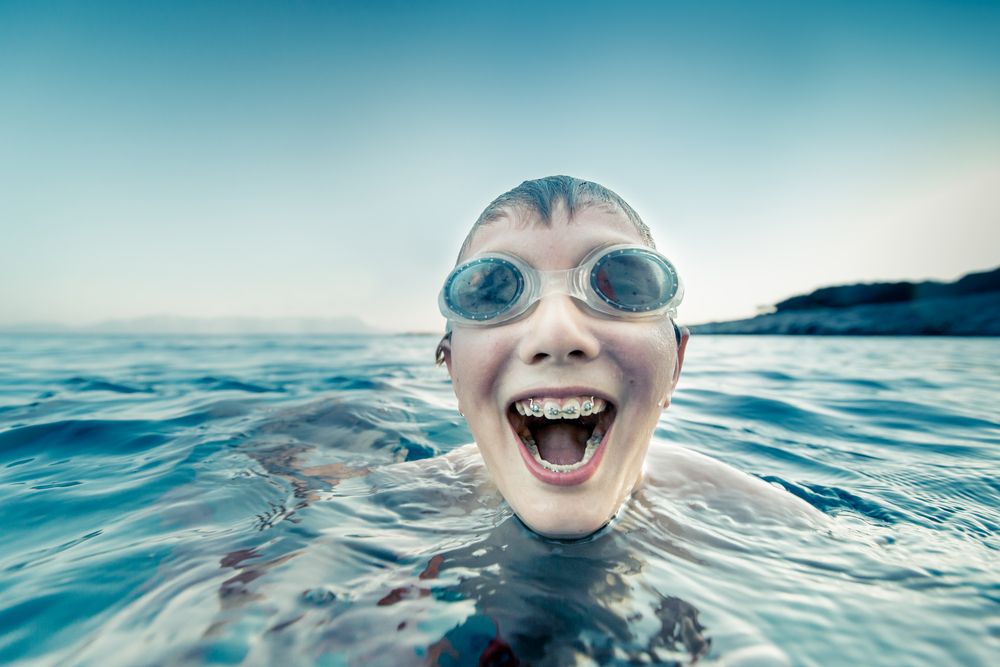 Can I swim with Invisalign? Is it safe to swim with braces? Can I continue to play watersports during orthodontic treatment? These are some of the questions my team and I get from our Brooklyn Invisalign and braces patients throughout the warm weather months. To help you soak up the last few weeks of summer, I’ll be filling you in on the logistics of splashing around with your appliance.
Can I swim with Invisalign? Is it safe to swim with braces? Can I continue to play watersports during orthodontic treatment? These are some of the questions my team and I get from our Brooklyn Invisalign and braces patients throughout the warm weather months. To help you soak up the last few weeks of summer, I’ll be filling you in on the logistics of splashing around with your appliance.
Table of Contents
Can I Swim With Braces on My Teeth?
Absolutely! The idea that your appliance can rust is a braces myth. Braces are made of a rust-resistant, titanium alloy material. After all, they’re designed to be in your mouth, surrounded by saliva 24 hours a day. Since they’re constantly bathed in spit without a problem, the same holds true for swimming with braces. Yes, pools do contain chemicals, but these chemicals won’t damage your hardware.
Can I Swim With Invisalign Aligners In My Mouth?
Yup. You can wear Invisalign while swimming. I design your Invisalign aligners based on a 3D model of your mouth for the perfect fit. Since the aligners are snug and custom-molded to your teeth, they won’t fall out in a pool or the ocean. And, again, chlorine from the pool won’t damage your appliance.
If you’d rather not wear Invisalign while swimming, you can take your aligners out before taking a dip. Keep in mind, however, that you should wear your aligners for 20 to 22 hours per day for the best Invisalign results. So, if you spend all day in the pool during the summer, or you’re a competitive swimmer who practices for hours, then it’s a better idea to keep those aligners in when you’re in the water.
Can I Play Watersports With Braces or Invisalign?
Whether you’re into the occasional game of pool volleyball or you’re an avid waterpolo player, orthodontic treatment won’t get in the way of doing your favorite summer activities. However, you will want to wear a mouthguard while engaging in watersports or doing any other activity that could result in a blow to the face. According to research published in Claims Journal, up to 39% of dental injuries occur while playing sports.
Not only does getting hit in the mouth put you at risk for a dental injury, including a chipped, broken or knocked out tooth, if you have braces, your appliance can get damaged and/or cut the inside of your mouth. Wearing a mouthguard will protect your teeth from trauma, keep your braces safe, and act as a buffer between your hardware and the soft tissues of your mouth.
While Invisalign doesn’t have brackets and wires and won’t cause lacerations if you sustain an injury like braces can, you’ll still need to wear a mouthguard. You’re investing in your smile so, of course, protecting it is important.
Plus, breaking or losing a tooth can have a negative impact on your Invisalign treatment. In extreme cases where you have an extensive injury, it could even mean creating a whole new treatment plan once your missing teeth have been replaced to account for any subsequent changes in your bite.
Speaking of Hot Weather…
While we’re on the subject of summer, there is one other thing to consider with Invisalign. Your Invisalign aligners are made of a thermoplastic material. As I said, as far as swimming and Invisalign, the material is durable enough to withstand chlorine, but it’s not meant to handle exposure to heat. This is why we tell our patients not to rinse their aligners with hot water or to drink hot beverages while they’re being worn.
If you take your aligners out to wear a mouthguard while playing watersports or while swimming, store them in your Invisalign case and then put your case in a shady spot. Don’t let your Invisalign sit in direct sunlight for long periods of time.
Never leave your aligners in a hot car either. The heat can cause the material to warp and affect how your aligners fit. In turn, this will affect how well they’re able to shift your teeth into place.
Key Takeaways:
- You can safely swim with braces on your teeth. They won’t rust and the chlorine won’t affect them.
- You can swim with Invisalign aligners in, too. If you’d rather take your aligners out to swim, just be sure you’re continuing to wear them for 20 to 22 hours per day.
- Wear a mouthguard when playing watersports, whether you have braces or Invisalign.
- Be careful not to leave your clear aligners in a hot car or in direct sunlight for long periods of time.
Connect with a Brooklyn Orthodontist!
If you have any more questions about your ability to swim with Invisalign or braces, reach out. My team and I are always happy to help.
If you haven’t kicked off treatment and you’re interested in learning more about your options for braces or Invisalign in Brooklyn, schedule a complimentary consultation at Fresh Orthodontics today!













